F. Schalow (ed.) Contributions To Phenomenology Heidegger, Translation, and the Task of Thinking Essays in Honor of Parvis Emad 10.1007/978-94-007-1649-0_1 Springer Science+Business Media B.V. 2011
The translators wish to express their deepest gratitude to Herr Dr. Hermann Heidegger for granting the copyright permissions to publish this English translation of Martin Heideggers essay, Die Armut, which first appeared in Heidegger Studie s, 10 (): 511
In the draft of an essay concerned with the historical periods of Europe, Hlderlin writes the following guiding dictum :
For us everything is concentrated upon the spiritual, we have become poor in order to become rich. (III, 621)
These words were written at a time when the eighteenth century was passing over into the nineteenth century. The opinion that Hlderlin makes this statement about his own time is so obvious that one would shy away from specifically taking note of it again. And yet, Hlderlin also says for us everything is concentrated upon the spiritual. Does this for us in the dictum refer only to the Germans and does the us here refer only to those who were then contemporaries of the European history in Hlderlins lifetime? This is an issue that cannot be immediately and easily decided. We know only this much: when Hlderlin speaks of history whereby he always has the Occident in mind, he thinks in terms of long stretches of time. When he calls us us, and says now, he does not mean the historically datable time of a particular instant in time in which he writes down the sentence; with us, of course, he refers to himself but himself not as the historically ascertainable person, but himself as the poet, who by poetizing rises above his own time and who intimates the years of the peoples ( An die Deutschen IV, 133) and who intimating in this manner is mindful of that which enowns what is sheltered-hidden in Western history but can never be read off the historically ascertainable events. Accordingly, Hlderlins words could have not been indeed about and for the time in which it was written, and that is why the time in which these words were written is a different time than the time of historical dates and the time of differentiable junctures of a century that is chronologically familiar.
Hlderlin says: For us everything is concentrated on the spiritual, we have become poor in order to become rich. We can only understand the content and the implications of this statement when we know what Hlderlin thinks when he says the spiritual.
The spiritual is indeed that which is determined from out of the spirit and by the spirit. But what is the spirit?
A long tradition of thinking has various answers ready for this question. It is said: spirit is the opposite of matter. Contrasted with the material, the spiritual is the immaterial. But this determination of the spirit and the spiritual is stuck in a mere negation of matter and the material. The Greek word ,, the Latin word

spiritus , and the French word lesprit definitely say more. The immaterial is the pneumatic and the spiritual. It means: spirit is the effective power of enlightenment and wisdom, what the Greeks call . In the Christian Churchs theologicalphilosophical speculation concerning the unitariness of God, this substance-akin essence of the spirit was carefully thought out. Consequently, Augustines work, De Trinitatae became decisive for the Western Roman Church as a different development occurred in the Oriental Church and particularly in Russia where the doctrine of holy Sophia was unfolded. This doctrine is even today alive in the Russian mysticism in a manner that we can hardly imagine. The efficacy of the spirit as the all-pervading power of enlightenment and wisdom (Sophia) is magical. The ownmost of the magical is as inscrutable and opaque as the ownmost of the pneumatic. Yet, we know that Jacob Bhme, the theosophist and philosopher the shoemaker from Grlitz, who from all the shoemakers was called the most quiet one had recognized the magical in the light of the shoemakers globe and thought of it as the primal will. Bhmes doctrine of the divine Sophia (theosophy) was known in Russia as early as the seventeenth century. In those days, the Russians referred to Jacob Bhme as the holy father of the Church. In Russia, at the beginning of the nineteenth century, a renewal of Jacob Bhmes influence came about simultaneously with the strong influence of Hegel and Schelling involving Vladimir Solovyov. It is thus no exaggeration when I say that what one nowadays conceives shortsightedly and incompletely as merely political or even roughly political and calls Russian Communism comes from a spiritual world about which we know hardly anything, even if we totally overlook the fact that we already forget to think the manner in which even Materialism taken roughly as the forefront of Communism is not itself something material, but rather something spiritual coming from a spiritual world that can only be experienced in and out of the spirit if its truth and untruth are to be fulfilled.
However, spirit is not only the effective will as substance, it is thought at the same time, but especially since Descartes right through modernity, as self-consciousness, that is, as subject and is as intellect, reason, understanding of the soul superordinated to, equated with, or juxtaposed to the principle of life in the sense of what is merely alive and body-akin (Cf., interpretation of Nietzsche by Ludwig Klages in his Der Geist als Widersacher der Seele [Leipzig, 19291932]. Klages takes spirit as understanding and thereby forgets the pneumatic and the spiritual of which Nietzsche was very well aware). The ownmost of the spirit is the primal will, which wills itself, and this will is at times thought as substance, at times as subject, and at times as the unity of both. We had briefly to recall these more or less familiar and prevailing metaphysical representations of the ownmost of the spirit because we want to heed what it means that Hlderlin thinks the ownmost of the spirit totally differently.
What is a spirit for Hlderlin? In what does the spiritual rest for him? What does he mean when he says that for us everything is concentrated upon the spiritual?
At about the same time as Hlderlin writes the dictum just mentioned, he writes a philosophical aperu from which we quote the following sentences (Cf., ber die Religion , III, 263).
Neither from out of himself alone, nor solely out of the objects that surround him, can man experience, that more than a mechanical course, there is a spirit, there is a god in the world, but of course he can experience it in a more lively relationship that is exalted above the pressing need, a relationship in which he stands together with that which surrounds him.

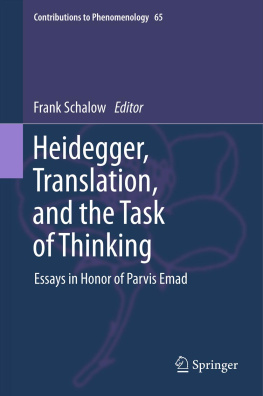
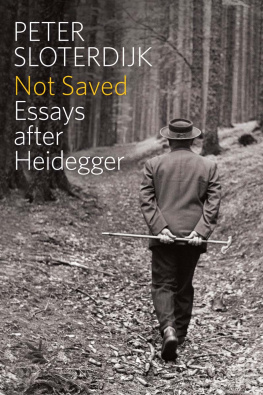

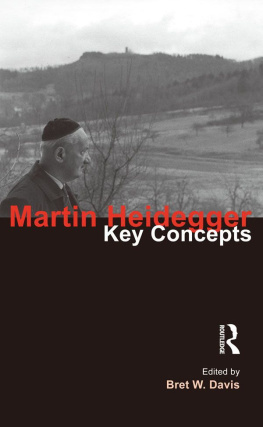
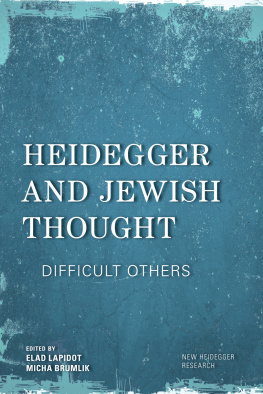
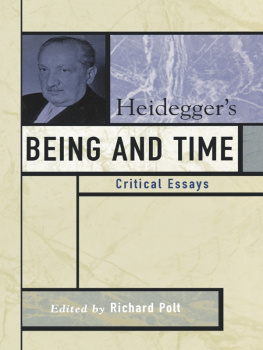
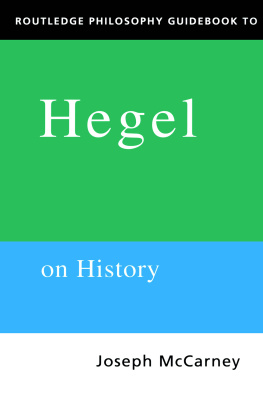


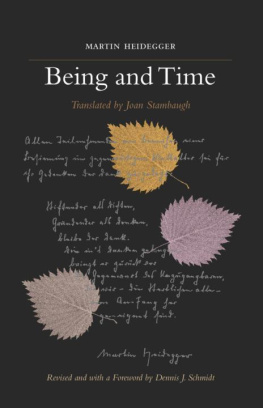
 spiritus , and the French word lesprit definitely say more. The immaterial is the pneumatic and the spiritual. It means: spirit is the effective power of enlightenment and wisdom, what the Greeks call . In the Christian Churchs theologicalphilosophical speculation concerning the unitariness of God, this substance-akin essence of the spirit was carefully thought out. Consequently, Augustines work, De Trinitatae became decisive for the Western Roman Church as a different development occurred in the Oriental Church and particularly in Russia where the doctrine of holy Sophia was unfolded. This doctrine is even today alive in the Russian mysticism in a manner that we can hardly imagine. The efficacy of the spirit as the all-pervading power of enlightenment and wisdom (Sophia) is magical. The ownmost of the magical is as inscrutable and opaque as the ownmost of the pneumatic. Yet, we know that Jacob Bhme, the theosophist and philosopher the shoemaker from Grlitz, who from all the shoemakers was called the most quiet one had recognized the magical in the light of the shoemakers globe and thought of it as the primal will. Bhmes doctrine of the divine Sophia (theosophy) was known in Russia as early as the seventeenth century. In those days, the Russians referred to Jacob Bhme as the holy father of the Church. In Russia, at the beginning of the nineteenth century, a renewal of Jacob Bhmes influence came about simultaneously with the strong influence of Hegel and Schelling involving Vladimir Solovyov. It is thus no exaggeration when I say that what one nowadays conceives shortsightedly and incompletely as merely political or even roughly political and calls Russian Communism comes from a spiritual world about which we know hardly anything, even if we totally overlook the fact that we already forget to think the manner in which even Materialism taken roughly as the forefront of Communism is not itself something material, but rather something spiritual coming from a spiritual world that can only be experienced in and out of the spirit if its truth and untruth are to be fulfilled.
spiritus , and the French word lesprit definitely say more. The immaterial is the pneumatic and the spiritual. It means: spirit is the effective power of enlightenment and wisdom, what the Greeks call . In the Christian Churchs theologicalphilosophical speculation concerning the unitariness of God, this substance-akin essence of the spirit was carefully thought out. Consequently, Augustines work, De Trinitatae became decisive for the Western Roman Church as a different development occurred in the Oriental Church and particularly in Russia where the doctrine of holy Sophia was unfolded. This doctrine is even today alive in the Russian mysticism in a manner that we can hardly imagine. The efficacy of the spirit as the all-pervading power of enlightenment and wisdom (Sophia) is magical. The ownmost of the magical is as inscrutable and opaque as the ownmost of the pneumatic. Yet, we know that Jacob Bhme, the theosophist and philosopher the shoemaker from Grlitz, who from all the shoemakers was called the most quiet one had recognized the magical in the light of the shoemakers globe and thought of it as the primal will. Bhmes doctrine of the divine Sophia (theosophy) was known in Russia as early as the seventeenth century. In those days, the Russians referred to Jacob Bhme as the holy father of the Church. In Russia, at the beginning of the nineteenth century, a renewal of Jacob Bhmes influence came about simultaneously with the strong influence of Hegel and Schelling involving Vladimir Solovyov. It is thus no exaggeration when I say that what one nowadays conceives shortsightedly and incompletely as merely political or even roughly political and calls Russian Communism comes from a spiritual world about which we know hardly anything, even if we totally overlook the fact that we already forget to think the manner in which even Materialism taken roughly as the forefront of Communism is not itself something material, but rather something spiritual coming from a spiritual world that can only be experienced in and out of the spirit if its truth and untruth are to be fulfilled.